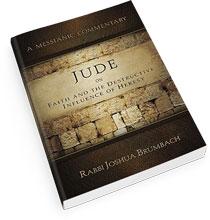Jude on Faith and the Destructive Influence of Heresy

Let’s face it. The book of Jude, in the Apostolic canon of Scripture, is one of the most overlooked and superficially understood epistles in the entire Bible. Within the Apostolic canon, the Pauline epistles are generally the primary focus of both clergy and laymen alike. Although the epistles of James and Jude are highly probable as being written by the actual brothers of our Master, they have been arranged within the canon to reside at the end, almost as an afterthought. After the Gospels, the Pauline epistles take center stage and are the primary texts which shape Christian thought and theology.
In his commentary on Jude, Rabbi Joshua Brumbach challenges this prioritization and clearly presents compelling evidence of the importance of Jude’s epistle from both historical and theological positions. He shows that in the earliest canonical organizations, the epistle of Jude was included before the Pauline epistles and argues that its message should hold great significance for followers of Yeshua. Although many interpret Jude’s rebuke of “false teachers” as simply an appeal to sound doctrine and believe it to be the primary and almost singular focus of the epistle, Brumbach offers a more sound approach at how we should understand this appeal, saying:
Judah is concerned with more than just proper theology and doctrine of these believers; he is concerned with the entirety of their spiritual lives, including their behavior.1
Just like the epistle itself, Brumbach’s commentary is very brief (63 pages). However, this brevity should not be interpreted as insubstantial. On the contrary, the author has packed a surprising amount of research and interpretation in a few short pages. It is not only informative, but engaging as well. I especially appreciated his treatment of the connections to apocryphal materials.
When I first saw this work, I was curious as to how the text of Jude would be handled from a Messianic perspective. I was particularly interested, because of Jude’s use of non-canonical, apocryphal texts and how most Christian commentary seems to gloss over these important connections Jude makes with these texts. I was pleasantly surprised at Brumbach’s treatment of the connections between the text of Jude and these sources, as well as his conclusions of Jude’s purpose for weaving these allusions and direct references into his message.
Not only is Judah [Jude] familiar with the Hebrew Bible, his use of apocryphal works is at least as extensive as his use of the Tanakh. He demonstrates close familiarity with 1 Enoch in verse 6 and directly quotes from it in verses 14–15. He also likely employs the Testament of Moses in verse 9.2
One of the connections Jude makes between the Hebrew Scriptures and apocryphal literature is verses 5-8. Brumbach helps the modern reader connect the three seemingly unrelated subjects — the unbelievers of verse 5, the rebellious angels of verse 6 and the residents of Sodom and Gomorrah in verse 7 — with a common theme, which would have been fairly obvious to his first century readers who would have been familiar with Jewish midrash on these subjects. Brumbach ties them together with a common thread which supports the epistle’s admonition against rebellion and unbelief.
Another section which will fascinate readers is his treatment of how familiarity with midrash can help us to understand Jude’s cryptic story about the archangel Michael and the Satan quarreling over the body of Moses (vs. 9–10). Both the reference to this story and the intended message are treated with deftness and will surely give the reader food for thought.
What seems like Jude’s overarching message is found in Brumbach’s comments midway through his commentary. He says:
The earliest followers of Yeshua felt a profound obligation to live and act in a way that hastened the return of the Messiah. Their conviction poses a challenge to us today to live, act, and think in the same way. We must live with an understanding that the true fruit of our relationship with God is determined by how we live it out through our deeds.3
In conclusion, I believe that if more of those who call themselves by the name of Yeshua would have the understanding contained in works such as this, our loss of those who have “shipwrecked” their faith would be much less than at present. I highly recommend this book for both personal and group study, for both academic and practical application.








